May 6, 2021 | Paige Scheinberg, ATR-BC & Catherine Harris, ATR-BC, TN Art Therapy Association Governmental Affairs Committee Co-Chairs
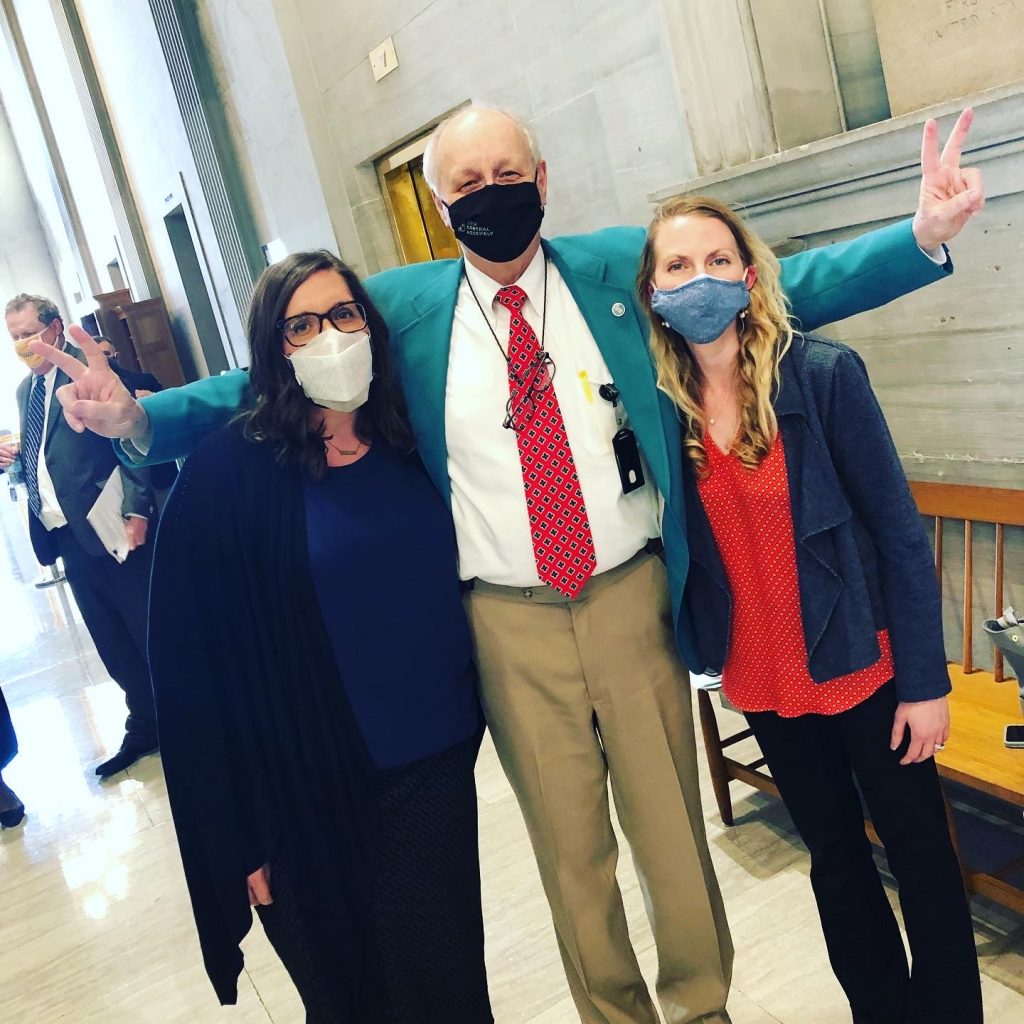
Paige & Catherine with House Sponsor Rep. Bob Ramsey
“We did it, y’all! We passed the Senate and the House… and, now, the Governor has signed our bill. We now have an Art Therapy License in Tennessee!!”
These words landed in e-mail boxes just a few weeks ago to our fellow art therapists, supporters, colleagues, family, and friends. Be assured, color text was involved and a celebratory confetti gif, as this headline was over six years in the making and the result of a road filled with twists and turns, cliffs and avalanches. But, it was also a road that led us to building relationships – meaningful, reciprocal, positive relationships – with state leaders and organizations, medical and mental health professionals, state universities, and art therapy programs and clients. And, let’s not forget the way our incredible community of TN art therapists came together as we worked with and learned from each other along the way.
Honestly, neither of us went into this as governmentally-minded or politically-interested people, and it took mutual, ongoing pep talks (and venting sessions) to keep each other on board with each new legislative session. But, we were (are!) passionate about advocating for art therapy. We believed in each other. We had faith in our fellow art therapists and the impact this license would — and now will — have on our state. And, the more we kept showing up year after year, the more people started showing up and supporting us (and taking us seriously) too.
Now, we’re here to support YOU! Whether you have just started with advocacy and legislative efforts in your own state or you have been at it for a while, we hope some of our experiences and lessons learned along the way will help energize and inspire you to keep doing the incredible work you’re doing.
TOP 5 ADVOCACY TIPS
1) Get Started
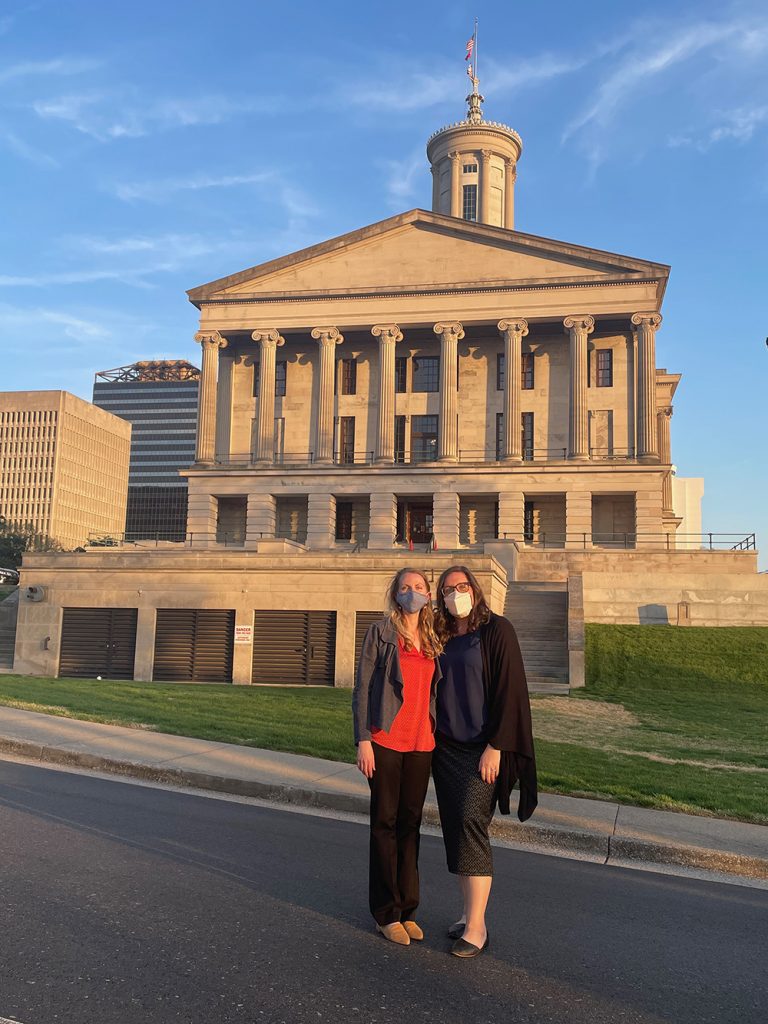
Catherine & Paige in front of the TN Capitol Building
We know it’s daunting. We know you don’t know anything about writing a bill or getting a bill passed. Don’t worry! Neither did we. But, the only way to achieve anything is to start somewhere. (And, AATA’s public policy team and resources will guide you every step of the way!)
Our #1 tip for getting started is to find a partner and/or a team to work with you. You cannot do this alone. Life will happen. Family will happen. Work will happen. Health challenges will happen. People’s time and energy will ebb and flow. There may not be a lot of people — or seemingly enough people — to help. (We only had 35 art therapists and art therapy students in TN when we started these efforts, and much of the time, it was just the two of us forging ahead.) BUT, as long as you know you and your partner (and your GAC committee if you’ve got one) are committed, you know they’ll circle back with time and energy as soon as they’re able.
This made a world of difference for and to us over the past six years.
2) Make Connections, Build Relationships
We started by encouraging the Tennessee Art Therapy Association (TATA) to focus on and invest in building relationships with professional organizations — such as the TN Psychological Association and the TN Arts Academy (a program of the TN Dept of Education) — and attending and volunteering for events hosted by other mental health and arts-related organizations.
We quickly realized that many — if not most — professionals did not know that TATA existed, nor did they know that art therapy was its own, distinct profession. We made a conscious decision to see these moments and realizations as opportunities AND had to stay mindful to refrain from getting defensive or overly disappointed that this was the present reality.
The relationships we built with these professionals and organizations over the years ended up being vital lifelines, as they helped us connect with and garner support from legislators (including securing our champion sponsors!), professional organizations and groups, and even lobbyists.
Remember, every interaction is an opportunity.
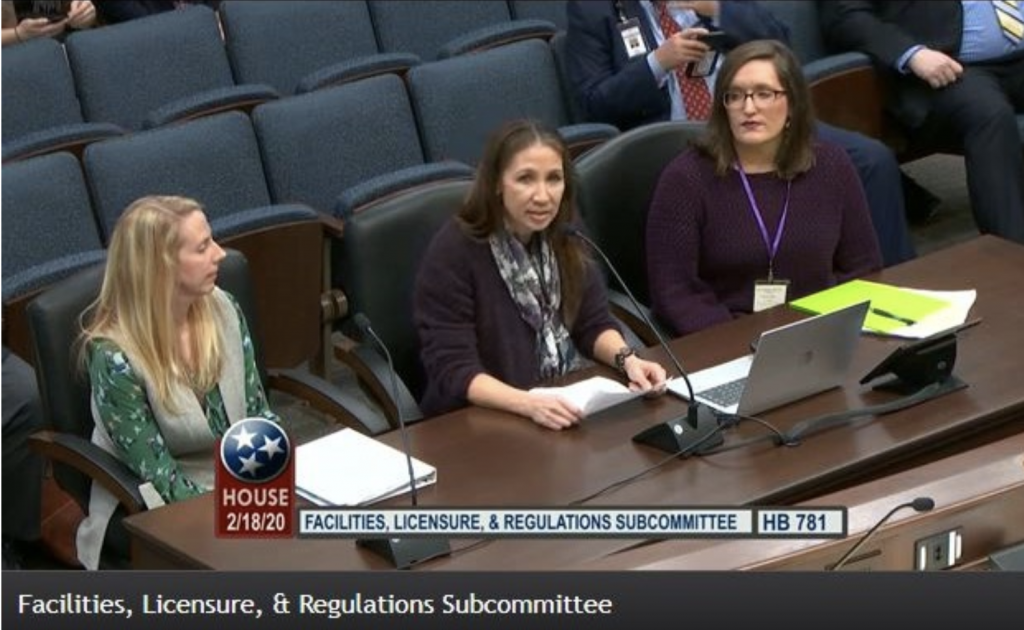
Dr. Sylvia Richey, CMO & Director of Integrative Oncology at West Cancer Center, testifying before a House Committee on behalf of the TN Art Therapy Licensing bill with Catherine Harris and Paige Scheinberg.
3) Empower Your Community to Advocate
The #1 Advocacy Myth: An art therapy advocate has to meet with and talk to legislators.
This. Is. False.
Over the years, we found that most of our members and supporters were intimidated by or even opposed to talking to legislators. We get it. We were in the same boat. (Paige often shares about how she would sweat and shake as she practiced for legislator meetings at home in the first few years. Catherine can now tell you where all the hidden and quiet stairwells are in the TN Capitol, where she collected her thoughts and her breath in between meetings.)
BUT, there are so many ways to be an advocate, and we made sure to educate and remind our TATA members and supporters of the numerous options for being an advocate: talk, meet, organize, attend, gather, send, create, design, share, fundraise. Ask them (and yourself!): What do YOU enjoy doing? What are YOUR strengths? Encourage people to start there and find where their energy is.
We never found a person who couldn’t help in their own way that truly wanted to.
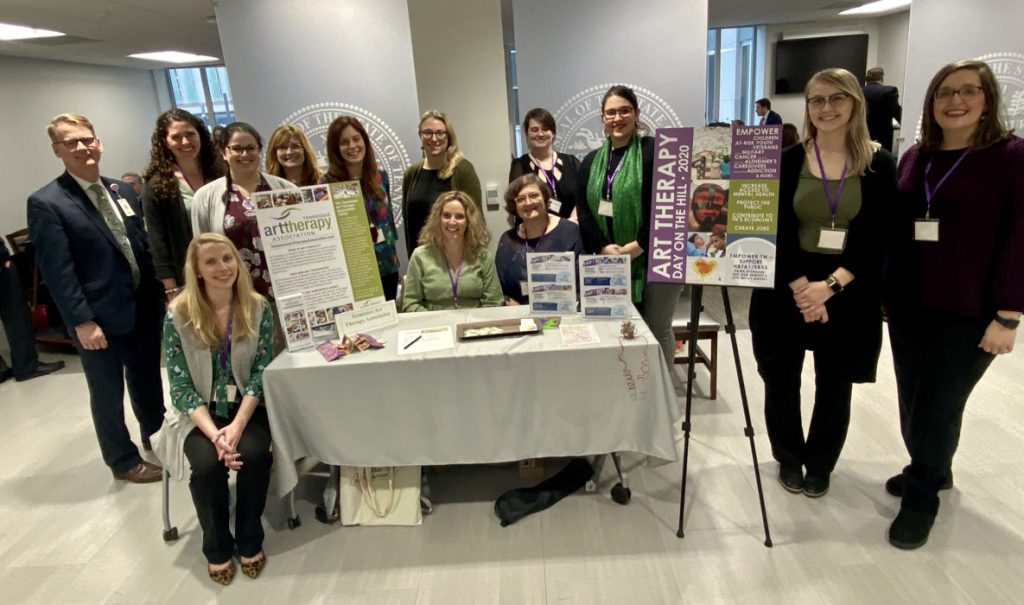
Art therapists from across the state gathered at the TN Capitol in Feb. 2020 for the first Art Therapy Day on the Hill.
4) Give People Exactly What They Need To Contact Legislators
It was a significant challenge getting people to contact their legislators. Sending an email asking people to e-mail their legislators DID NOT WORK. However, sending an e-mail with 1) a link to find their legislators and their contact info, 2) a script for what to say when calling their legislator, and 3) an e-mail template to forward to their legislators DID WORK. This works for contacting entire House and Senate Committees in the days leading up to a vote too!
Once we started sending people exactly what they needed and giving them easy and seamless ways to contact legislators, they got involved and stayed involved.
5) Stay Connected with AATA!
We would not have achieved a state art therapy license without AATA. During the first few years, we must have talked to the AATA public policy team (Hello, Clara & Dean!) weekly, if not daily at times. As we gained our footing and confidence, the calls were less frequent. But, we stayed in touch, and they were still always “on-call” for us. Their guidance, expertise, and encouragement over the years meant so much to us — and literally helped save our bill on numerous occasions.
Thank you, thank you, thank you, AATA.
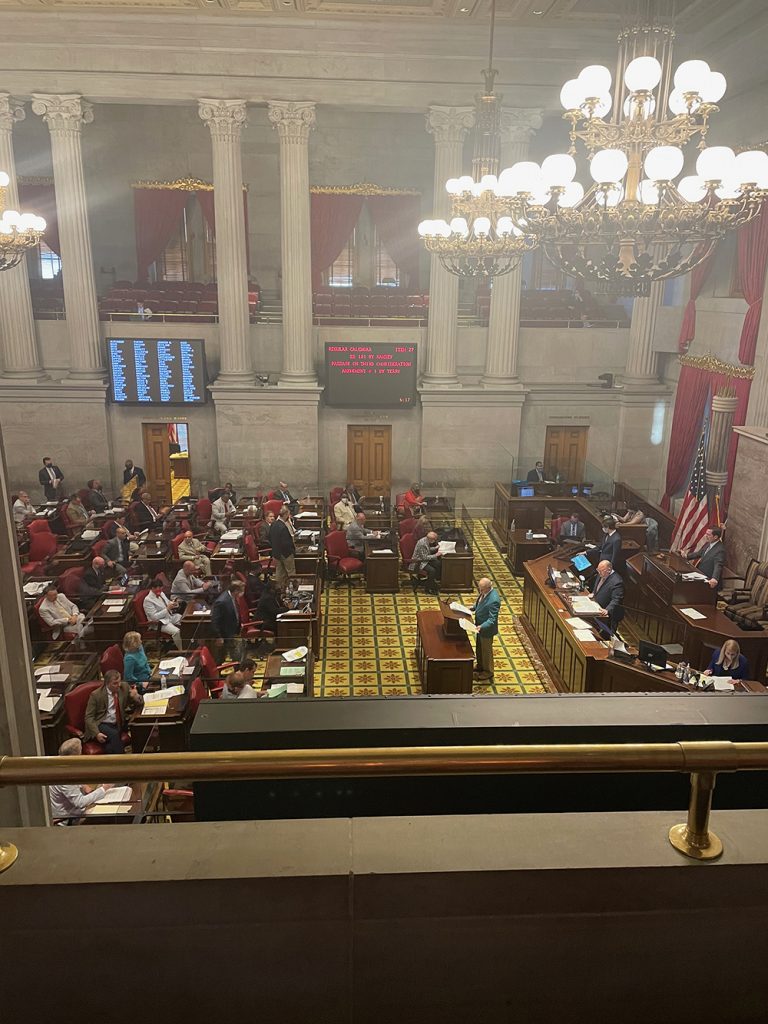
TN Rep. Bob Ramsey presenting the bill before the House Floor Session
ADVOCACY RESOURCES
Over the years, we created A LOT of materials to try to communicate info about art therapy, the need for licensure, and what a license would and would not do. We started with a binder we would leave with legislators at meetings, but learned they weren’t looking at them. So, as we met with legislators and learned what they responded to or asked about, we edited our materials each year and throughout each legislative session down to one-page info sheets and flyers. Here are our primary materials we used the last year leading up to achieving our license.
- Bill Talking Points (given at all legislator meetings and emailed to committee members the day before each committee hearing)
- Testimonials/Support Sheet (often given with the talking points – showed the wide array of support across professions and the state)
- Empower TN Postcard (which developed into an e-mail campaign showing the benefits of art therapy with different client populations and highlighting the work of specific art therapists and organizations in TN)
YOU’VE GOT THIS!
We hope hearing about some of our experiences is helpful and energizing to you. We know advocacy can be hard and draining and frustrating at times. And, we also know this work makes a difference. YOU make a difference.
We are proud and grateful for the journey we’ve been on — and feel passionate about continuing to advocate and grow art therapy and mental health access in our state and beyond. Please stay connected and let us know if we can continue to support you in your own advocacy and licensure efforts!
~ Paige & Catherine
Paige Scheinberg, ATR-BC
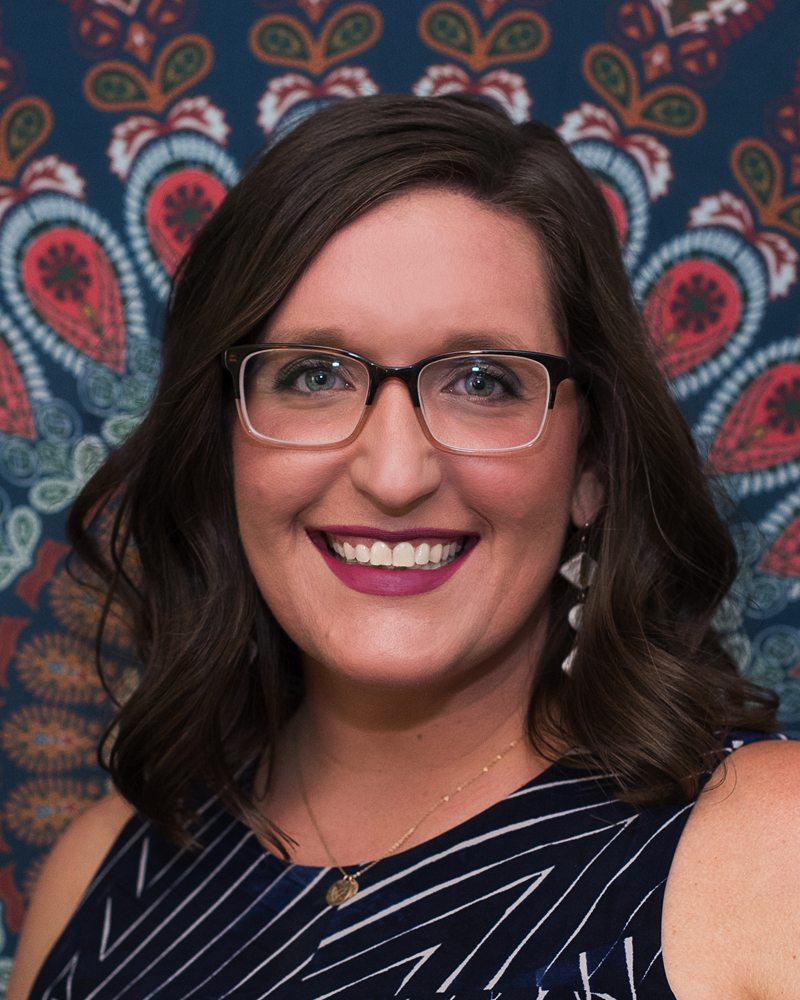
Paige often describes herself as a well-being enthusiast and lover of all things creative. As an art therapist, mindfulness and meditation teacher, and yoga teacher, her passion is to help you cultivate sustainable happiness and flourish in your personal and professional life through creative experiences and self expression – to let your light shine.
Through her company, SHINE ON Consulting, Paige offers integrative art therapy services, workshops, and trainings for personal and professional development in creativity, well-being, and self-care. Currently, Paige primarily works with adult oncology survivors and their families at West Cancer Center & Research Institute. As the art therapist for the Brooks Museum, she also provides group art therapy with youth in the corrections and/or court system, as well as art therapy-inspired public workshops for adults and professionals. Additionally, Paige loves creating and exploring mandalas and enjoys building a global mandala community with her Creating Mandalas team.
Since receiving her Master of Science in Art Therapy and Counseling degree from Eastern Virginia Medical School, Paige has been deeply committed to raising awareness of, advocating for, and supporting the art therapy profession and art therapists through her volunteer work with a variety of organizations and providing art therapy supervision and consultation.
paige@SHINEONconsulting.com, @SHINEONwithPaige
Catherine Harris, ATR-BC
 Catherine graduated from The George Washington University with a master’s degree in art therapy in 2007. Since then, Catherine has worked in a variety of settings as a board certified art therapist but always with the same intention to help clients engage in their own art-making, creativity, and discussion to help find ease among life’s many challenges. Early in her career, Catherine developed a private practice in art therapy by contracting with over twenty organizations in west and middle Tennessee, including the Dixon Gallery and Gardens, the Memphis Brooks Museum, and the Ronald McDonald House of Memphis.
Catherine graduated from The George Washington University with a master’s degree in art therapy in 2007. Since then, Catherine has worked in a variety of settings as a board certified art therapist but always with the same intention to help clients engage in their own art-making, creativity, and discussion to help find ease among life’s many challenges. Early in her career, Catherine developed a private practice in art therapy by contracting with over twenty organizations in west and middle Tennessee, including the Dixon Gallery and Gardens, the Memphis Brooks Museum, and the Ronald McDonald House of Memphis.
In 2011, Catherine moved to Nashville, where she began working as a full-time art therapist for TriStar Centennial Medical Center. While she started in the hospital’s inpatient and intensive outpatient behavioral health programs, she later took on a new role created to expand expressive therapy services to the medical hospitals of Centennial’s campus. For the six years she worked in this position, Catherine both created art therapy programs for the individuals admitted to Centennial’s services in oncology, pediatrics, bariatric and orthopedic surgery and managed the music therapy and recreation therapy programs for these same areas.
Catherine recently returned to the world of private practice when she opened HeartSpace Wellness Studio last fall. Through her practice, Catherine provides virtual art therapy sessions for individuals, classes and workshops for organizations, and clinical supervision for recent art therapy graduates. Catherine uses an integrative approach in her work, combining art therapy with practices in mindfulness, yoga, and mindful self-compassion.
HeartSpaceNashville@gmail.com, @catherinemichelleharris
